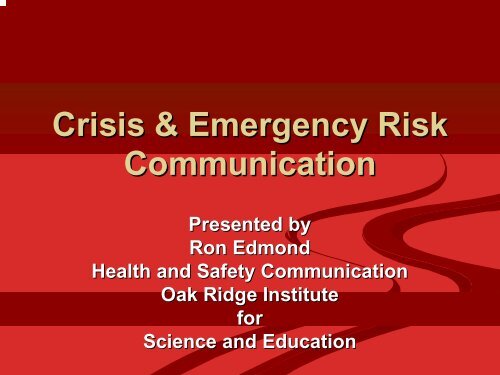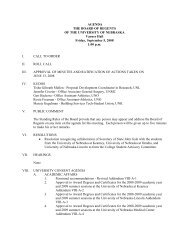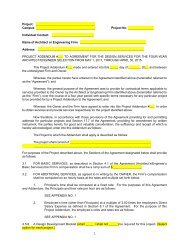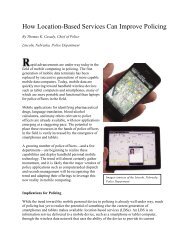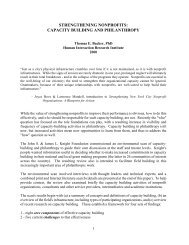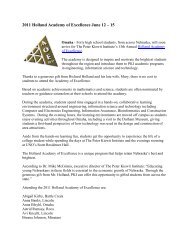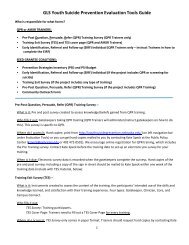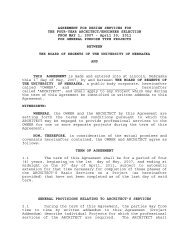Risk and Crisis Communication - Nebraska Disaster Behavioral Health
Risk and Crisis Communication - Nebraska Disaster Behavioral Health
Risk and Crisis Communication - Nebraska Disaster Behavioral Health
Create successful ePaper yourself
Turn your PDF publications into a flip-book with our unique Google optimized e-Paper software.
<strong>Crisis</strong> & Emergency <strong>Risk</strong><br />
<strong>Communication</strong><br />
Presented by<br />
Ron Edmond<br />
<strong>Health</strong> <strong>and</strong> Safety <strong>Communication</strong><br />
Oak Ridge Institute<br />
for<br />
Science <strong>and</strong> Education
TEAMWORK<br />
3 KEY MESSAGES…<br />
MESSAGES<br />
PROACTIVITY<br />
PREPARATION<br />
Preparation<br />
Preparation<br />
Preparation<br />
2
Why <strong>Crisis</strong><br />
Emergency <strong>Risk</strong><br />
<strong>Communication</strong> is<br />
Different
Communicating in a crisis is<br />
different<br />
In a serious crisis, all affected people . . .<br />
Take in information differently<br />
Process information differently<br />
Act on information differently<br />
In a catastrophic event: communication is<br />
different<br />
Be first, be right, be credible<br />
4
Yes, leaders communicate, <strong>and</strong><br />
In a catastrophic event, your . . .<br />
every word,<br />
every eye twitch<br />
every passing emotion<br />
. . . resonates with heightened importance to the<br />
public<br />
5
What the public seeks from your<br />
5 public concerns. . .<br />
Gain wanted facts<br />
communication<br />
Empower decisionmaking<br />
Involved as a participant, not spectator<br />
Provide watchguard over resource allocation<br />
Recover or preserve well-being <strong>and</strong> normalcy<br />
6
<strong>Crisis</strong> <strong>and</strong> Emergency <strong>Risk</strong><br />
<strong>Communication</strong> impacts<br />
5 organizational concerns -- you need to. . .<br />
Execute response <strong>and</strong> recovery efforts<br />
Decrease illness, injury, <strong>and</strong> deaths<br />
Avoid misallocation of limited resources<br />
Reduce rumors surrounding recovery<br />
Avoid wasting resources<br />
7
5 communication failures that kill<br />
operational success<br />
Mixed messages from multiple experts<br />
Information released late<br />
Paternalistic attitudes<br />
Not countering rumors <strong>and</strong> myths in realtime<br />
Public power struggles <strong>and</strong> confusion<br />
8
5 communication steps that boost<br />
operational success<br />
Execute a solid communication plan<br />
Be the first source for information<br />
Express empathy early<br />
Show competence <strong>and</strong> expertise<br />
Remain honest <strong>and</strong> open<br />
9
The STARCC Principle<br />
Your public messages in a crisis must be:<br />
Simple<br />
Timely<br />
Accurate<br />
Relevant<br />
Credible<br />
Consistent<br />
10
Psychology<br />
of a <strong>Crisis</strong>
What Do People Feel Inside<br />
When<br />
a <strong>Disaster</strong> Looms or Occurs?<br />
Psychological barriers:<br />
Fear, anxiety, confusion, dread<br />
Hopelessness or helplessness<br />
Seldom panic<br />
Fight or flight<br />
Vicarious rehearsal<br />
12
Communicating in<br />
a <strong>Crisis</strong> Is Different<br />
Uncertainty is greatest concern for most<br />
Reduce anxiety-give people things to do<br />
Public seeks restored self-control<br />
Public must feel empowered – reduce fear<br />
<strong>and</strong> victimization<br />
13
People simplify<br />
Decisionmaking in<br />
a <strong>Crisis</strong> Is Different<br />
Cling to current beliefs<br />
We remember what we see or previously<br />
experience (first messages carry more<br />
weight)<br />
People limit intake of new information (3-7<br />
bits)<br />
14
<strong>Risk</strong> <strong>Communication</strong><br />
Principles for<br />
Emergencies
<strong>Risk</strong> <strong>Communication</strong> Principles<br />
Don’t overreassure<br />
for Emergencies<br />
Considered controversial by some<br />
A high estimate of harm modified downward<br />
is much more acceptable to the public than<br />
a low estimate of harm modified upward<br />
16
<strong>Risk</strong> <strong>Communication</strong> Principles<br />
for Emergencies<br />
When the news is good, state continued<br />
concern before stating reassuring updates<br />
“Although we’re not out of the woods yet,<br />
we have seen a declining number of cases<br />
each day this week.”<br />
“Although the fires could still be a threat, we<br />
have them 85% contained.”<br />
17
<strong>Risk</strong> <strong>Communication</strong> Principles<br />
for Emergencies<br />
Under promise <strong>and</strong> over deliver . . .<br />
Instead of making promises about<br />
outcomes, express the uncertainty of the<br />
situation <strong>and</strong> a confident belief in the<br />
“process” to fix the problem <strong>and</strong> address<br />
public safety concerns<br />
18
<strong>Risk</strong> <strong>Communication</strong> Principles<br />
for Emergencies<br />
Give people things to do - anxiety is reduced<br />
by action <strong>and</strong> a restored sense of control<br />
Symbolic behaviors<br />
Preparatory behaviors<br />
Contingent “if, then” behaviors<br />
3-part action plan<br />
- Must do X - Should do Y - Can do Z<br />
19
<strong>Risk</strong> <strong>Communication</strong> Principles<br />
for Emergencies<br />
Allow people the right to feel fear<br />
Don’t pretend they’re not afraid, <strong>and</strong> don’t<br />
tell them they shouldn’t be<br />
Acknowledge the fear, <strong>and</strong> give contextual<br />
information<br />
20
Accuracy of<br />
Information<br />
__________<br />
Speed of<br />
Release<br />
Empathy<br />
+<br />
Openness<br />
CREDIBILITY<br />
+<br />
TRUST<br />
=<br />
Successful<br />
<strong>Communication</strong><br />
21


